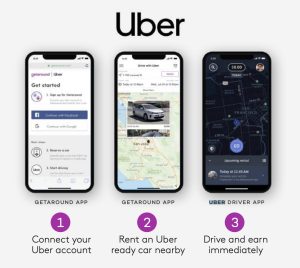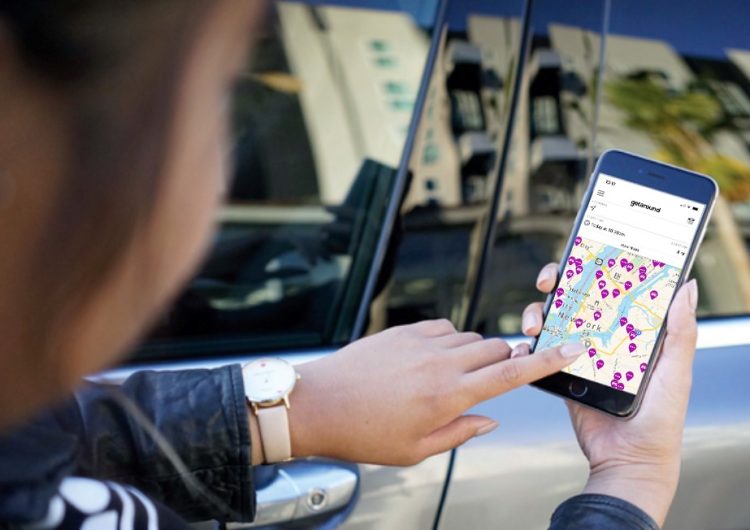
- Carsharing platform Getaround going public via merger with InterPrivate II Acquisition Corp. (NYSE: IPVA)
- Getaround allows car owners to rent cars to customers on marketplace platform similar to Airbnb
- Getaround boasts strong lead, with 20x more connected cars than nearest rival
- Superior economics with a 48% “take rate” — far above Airbnb and Turo
- Getaround has 10-year track record, with $500 million raised from VCs and strategic investors
- IPO Edge estimates up to $100 million in 2023 revenue
- Top 20 cities already Ebitda positive, transaction proceeds sufficient to reach company-level profitability
- Has integration deals with Toyota Motor Corp., Tesla Inc. for “Getaround Ready” vehicles
- Toyota also a financial partner via investment in Getaround
- Partnered with Uber Technologies, Inc. to offer cars for drivers within the app
These days, consumers can utilize sharing platforms for everything from an Irish castle on Airbnb, Inc. to a neighbor’s swimming pool on Swimply. But there’s another industry likely riper for disruption with superior economics to boot: Carsharing.
Investors keen to ride the trend should consider leading carsharing platform Getaround, which is going public through a merger with InterPrivate II Acquisition Corp. (NYSE: IPVA). The company, founded not long after Airbnb in 2011, offers a similar solution by letting carowners lease to other drivers when they don’t have a need for cars themselves.
There’s reason to argue Getaround’s business is superior to other sharing platforms in several regards. First, the technology is fully digital after a one-hour hardware installation. Once the Getaround system is in place, an owner can let a renter gain access to a vehicle simply using a smartphone – which essentially acts as a car key.

After the renter gains access, the entire process is streamlined and tracked via the Getaround Cloud. The system includes everything from monitoring fuel use to billing users for tolls they might pass on a highway. That is a different model from, say Turo, which also offers short-term rentals but has more cost and friction associated with human interaction (to deliver and book vehicles, for instance).
Such simplicity appeals strongly to renters who want a quick, seamless experience when booking, driving, and returning a vehicle. Customers who spend less time with the hassles of booking are both likely to return to Getaround more often and pay a premium for the ease and convenience.
Technology also helps optimize the car owner’s experience. Getaround crunches data to determine optimum pricing levels based on local supply and demand – along with situation-specific risk. It also has a robust “know your customer” framework to verify identities, block abusers, and detect fraud or abusive behavior.
Further streamlining the experience are key partnerships Getaround has established with major players. It has linked up with both Toyota and Uber to build “Getaround Ready” cars that come equipped with the Getaround system right off the assembly line, similar to vehicles that let drivers instantly subscribe to Sirius XM. Such placement will create a serious moat around the business from any challengers.

What’s more, Getaround struck a deal with Uber to connect the two apps and seamlessly offer drivers short-term rentals. That’s an elegant solution for part-time gig workers who may not be able or willing to own their own vehicles but want to drive for extra cash during select time windows.
Major companies are noticing the carsharing boom – and talking about it. The number of mentions of “carsharing” in public documents has exploded in the last few years, according to data from Sentieo, an AI-enabled research platform (see chart below).

Importantly, Getaround has built a team of so-called powerhosts who invest in fleets of cars (both large and small) to create small businesses of their own. That’s much more likely to happen with cars than real estate by simple virtue of the lower cost of purchasing a car.
Such powerhosts accounted for a whopping 71% of gross booking value between 2020 and 2021. And it’s no wonder so many entrepreneurs have stuck with Getaround: the average car generated more than $10,000 in 2021, enough to overcome most ownership costs and deliver a profit.
Getaround can succeed in a range of geographies with different population densities. In a place like New York, Getaround can focus on ridesharing and short-term rentals for the many residents who don’t own cars. Just as easily, Getaround can thrive in Atlanta where most people do own cars but there’s demand from people driving to weekend destinations or visiting on business.
It’s also notable that Getaround’s car owners need very little infrastructure to begin operating. The company can accommodate most types of parking – including valet and garages. But about 60% of its vehicles are simply parked on the street where customers pick them up and return them – again without any human contact.
Getaround has moved full speed head since it was founded by CEO Sam Zaid in 2011, raising $500 million from venture capital and strategic investors. Over that time, it has risen to one of the top two carsharing platforms globally, operating in 950 cities across 8 countries, with 1.6 million unique guests renting a current fleet of 66,000 cars from hosts.

Getaround Founder and CEO Sam Zaid
The company benefits both from a large amount of repeat business – 84% of ride revenue comes from returning customers – but also strong demand from new users. Each cohort from the last few years has spent considerably more than the comparable class of users the year before.
All this translates to an impressive financial profile. One metric investors should consider is Getaround’s so-called take rate that reflects the percentage each dollar booked it keeps for itself. Getaround’s take rate of 48% compares with 37% at Turo, 18% for Uber and a mere 13% for Airbnb.
Drilling into the numbers further, Getaround is on a clear path to profitability. In 2021, the company averaged positive Ebitda in its top 20 markets. And investments are paying off: The company generates a 13x return-on-ad-spend across its business. The going-public transaction is expected to generate sufficient proceeds to executive Getaround’s plan and reach positive Ebitda at the company level.
Turning to the top line, Getaround averaged 25% annual revenue growth between 2019 and 2021, despite Covid-related challenges. Conservatively assuming a similar pace through 2023, the company will reach nearly $100 million in annual revenue next year.
In further years, the potential for growth is even greater, particularly as Getaround locks in more partnerships with manufacturers for “Getaround Ready” vehicles and deals like the Uber arrangement begin to bear fruit.
It’s clear that the likes of Airbnb and Lyft are helping consumers live the way they want. But Getaround’s model looks to be even more promising, given its superior economics and head start over rivals. Investors who jump in now should enjoy a road to strong returns.
Contact:
www.ipo-edge.com
Editor@ipo-edge.com
Twitter: @IPOEdge
Instagram: @IPOEdge







